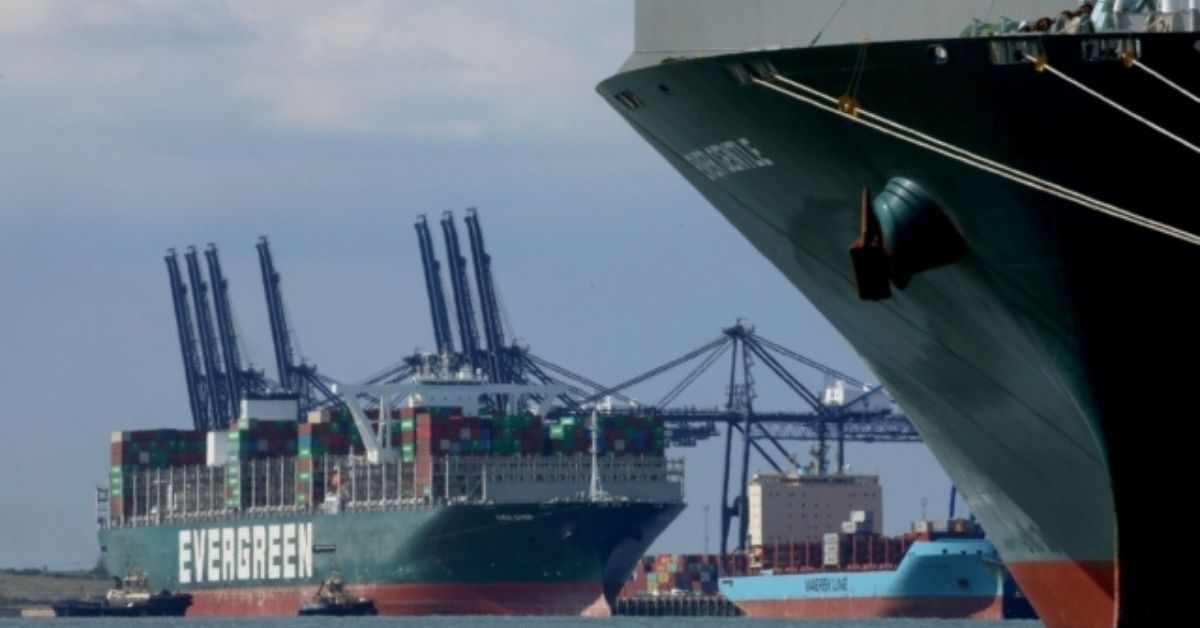The global shipping crisis that is causing deepening shortages and shutdowns in Britain’s shops and factories will last for as long as nine months, as giant vessels carrying Christmas goods start to queue in the English Channel to unload in Europe’s congested ports.
A body representing British ports said that it expects the congestion affecting deliveries to millions of retailers and businesses to persist potentially until next summer as the shipping industry struggles with challenges from container shortages to a lack of lorry drivers to move cargo once it reaches quaysides.
One major shipping line told i that the delays, which are forcing vessels to anchor in clusters in the English Channel and North Sea, will have a knock-on effect for supplies of consumer goods and manufacturing components in the coming weeks and months – with a risk that up to 20 per cent of goods ordered for peak Christmas demand will not reach retailers in time.
The spectacle of dozens of ships queuing to enter jammed ports on America’s west coast has become a familiar sight in recent weeks, as global supply chains from China and the Far East suffer bottlenecks caused by a “perfect storm” of factors such as port closures caused by the Covid-19 pandemic, labour shortages and a lack of warehouse space.
Among the goods feared likely to be delayed for Christmas are bicycle parts, toys, garden furniture and sporting equipment.
i has established that similar problems are now reaching Europe, with vessels waiting at anchor for up to a week to enter major European hubs. The two biggest container ports – Rotterdam and Antwerp – are working to full capacity and experiencing “heavily disrupted operations”, according to logistics giant Kuehne+Nagel.
Both the Dutch and Belgian ports are major trans-shipment points for goods destined for the UK, alongside vessels arriving directly from China and the Far East to ports such as Felixstowe and Southampton.
It follows a warning this week, first reported in i, from a senior minister that shipping congestion is leading to increasing alarm in Whitehall that it will cause acute shortages in the run up to Christmas.
Consumers are being urged to do their Christmas shopping now to avoid missing out on goods in the run up to the festive season.
The British Ports Association (BPA), which represents 85 per cent of UK ports, said there was plenty of capacity and its members were not suffering the same scale of congestion being seen on the Continent.
However, it acknowledged there were problems across Britain due to customers leaving containers in ports for longer because they have run out space in warehouses or due to the ongoing shortage of lorry drivers.
The BPA said it expected problems to endure for many months.
In a statement, it added: “We think these global issues with container shipping will persist for six to nine months, certainly beyond Chinese New Year in February.
“There are many overlapping issues contributing to these challenges, and even once these are resolved it will take time to clear the congestion. UK ports are working hard to keep ships and boxes moving quickly but driver shortages and tight warehousing space is adding pressure.”
Kuehne+Nagel, which tracks maritime cargo movements, said it had registered delays of up to six days since the beginning of October for container vessels to enter Continental ports.
Its Seaexplorer monitoring service yesterday showed clusters of vessels waiting off the Belgian, Dutch and German coasts. Antwerp Anchorage, a designated waiting zone for shipping, was hosting 80 vessels, a third of which were container or other cargo ships.
The shipping gridlock has its roots in a sudden and largely unanticipated spike in consumer demand during the pandemic as locked-down shoppers flocked online for items from exercise equipment to laptops to clothing.
A significant proportion of the world’s shipping containers – as much as 20 per cent – are subsequently sitting empty and out of position in Western ports.
Shipping companies, long plagued by a surfeit of vessels, suddenly find themselves with insufficient ships to cope with rocketing demand and “lumpy” supply as Chinese factories and ports suffer sudden shutdowns due to stringent anti-Covid measures.
The recent closure of Ningbo-Zhoushan Port, south of Shanghai in China, and clothing factories in Vietnam due to Covid-19 outbreaks, has had a further knock-on effect on global supply chains.
The average cost of shipping a standard 40ft cargo container has shot past £7,000 – a figure four times higher than it was a year ago. The average door-to-door shipping time has risen in the last 12 months from 41 days to 70.
Hapag-Lloyd, one of the world’s biggest shipping companies, said the industry was running at full capacity and some 80 per cent of the goods on order for the run-up to Christmas would reach their European destination on time.
A spokesman said: “Across the sector, everything which has got a propeller, floats and isn’t too rusty is being pressed into service. But there are many factors contributing to this situation and it is going to take time to be resolved.
“If you are a consumer you are going to have to expect delays. Christmas should be ok – still 80 per cent of good will arrive but there could be significant delays in specific areas such as spare parts, or furniture or sports equipment.”
Source : I News






